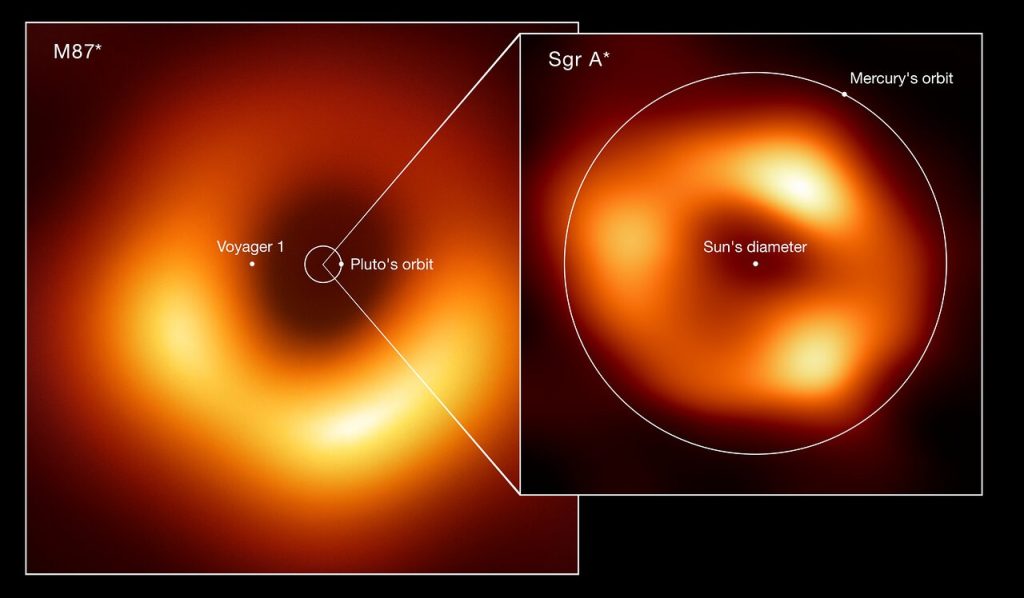Black holes have long intrigued scientists and astronomers. Recent theories suggest that black holes could potentially serve as cosmic portals for time travel.

Credit: www.nytimes.com
The Fascinating Phenomenon Of Black Holes
Defining Black Holes And Their Characteristics
Black holes are celestial objects in space with a gravitational pull so strong that it can trap even light from escaping. They are invisible to the eye, with no visible light coming from them. Here are some key characteristics of black holes:
- Black holes have a central point known as the “singularity,” where gravity becomes so strong that it warps the fabric of space and time.
- They have an event horizon, which marks the boundary beyond which nothing can escape the gravitational pull of the black hole.
- Black holes come in different sizes. Stellar-mass black holes are formed when a massive star collapses, while supermassive black holes, which are millions or billions of times more massive than the sun, can be found at the center of most galaxies.
How Black Holes Form And Their Effects On Space-Time
Black holes are formed through the collapse of massive stars. When a star runs out of fuel, the force of gravity causes it to collapse inward, eventually forming a singularity and an event horizon. Here are some effects black holes have on space-time:
- Black holes cause a distortion in space-time, which results in a phenomenon called gravitational lensing. This effect allows astronomers to observe objects behind a black hole.
- As matter is pulled closer to the black hole, it heats up and emits radiation, including x-rays and gamma rays.
- Black holes can have a profound impact on the surrounding galaxies, affecting the movement and distribution of stars, gas, and dust.
Understanding The Role Black Holes Play In Astrophysics Research
Black holes are among the most intriguing and puzzling objects in space. Despite their mysterious nature, they play a critical role in our understanding of the universe. Here are some ways black holes are studied in astrophysics research:
- Black holes are studied through a variety of methods, including x-ray telescopes, radio telescopes, and gravitational wave detectors.
- The study of black holes helps shed light on the formation and evolution of galaxies.
- Astrophysicists are using black holes to test einstein’s theory of relativity, which predicts the existence of black holes.
Time Travel: Fact Or Fiction?
Theories Of Time Travel And Its Possibilities
Time travel has been a topic of fascination and debate for many years. While it has been a popular theme in science fiction, many people believe that time travel is possible in reality. Here are some of the theories and possibilities of time travel:
- According to einstein’s theory of general relativity, time travel is possible by traveling through space at a speed faster than the speed of light. However, this is only a theoretical possibility, as the speed of light is considered an unbreakable barrier.
- Another theory suggests that time travel is possible through the use of wormholes. Wormholes are tunnels through space-time that connect different points in space. If these tunnels can be stabilized and traversed, it may be possible to travel through time.
- The concept of time dilation also offers the possibility of time travel. Time dilation occurs when an object moves at high speeds, causing time to appear to slow down. Therefore, an object traveling close to the speed of light may experience time differently than an object at rest.
The Science Behind Time Travel: Quantum Mechanics, Relativity And Wormholes
The science behind time travel is complex and involves a variety of scientific principles. Some of the main principles involved in time travel include:
- Quantum mechanics: This branch of physics deals with the behavior of matter and energy on the smallest scales. The study of quantum mechanics has led to the development of many theories about time travel, including the possibility of teleportation and parallel universes.
- General relativity: As mentioned earlier, einstein’s theory of general relativity plays a significant role in the possibility of time travel. This theory explores the relationship between space, time, and gravity, and suggests that time can be affected by the curvature of space-time.
- Wormholes: While the existence of wormholes is still a theory, there is some evidence to suggest that they may exist. The study of wormholes involves the use of complex mathematical equations to explore the possibility of traveling through space-time.
The Ethics And Paradoxes Of Time Travel
While the possibility of time travel may seem intriguing, there are several ethical concerns and paradoxes associated with it. Some of the main issues include:
- The butterfly effect: This theory suggests that even small actions can have significant consequences, leading to major changes in the future. If time travel were possible, even the smallest of actions could drastically alter the future.
- The grandfather paradox: This is a classic paradox of time travel, which suggests that if someone were to travel back in time and kill their grandfather, they would never have been born, leading to a paradox.
- The ethical concerns: Time travel could potentially lead to a host of ethical concerns, including issues with altering the course of history, interfering with free will, and causing irreparable damage to the future.
The possibility of time travel remains a fascinating and complex subject, filled with a variety of theories, scientific principles, and ethical concerns. While time travel may only be possible in the realm of science fiction, the ongoing research and exploration of the universe may someday lead to new discoveries and a better understanding of the concepts of time and space.
Cosmic Portals: Are They Real?
Unveiling The Science Of Wormholes And Their Possibilities
Wormholes, also known as einstein-rosen bridges, are tunnel-like structures that bridge two separate points in spacetime. They are formed when space folds, creating a shortcut between two vast distances. Here are the key points about the science of wormholes and their possibilities:
- Wormholes are purely theoretical and have only been observed in simulations.
- Existing scientific theories, such as general relativity and quantum mechanics, support the existence of wormholes.
- Wormholes could serve as shortcuts for space travel, allowing for rapid transportation between different parts of the universe.
- The potential benefits of using wormholes for space travel are enormous, with the possibility of enabling interstellar travel and expanding human exploration across the universe.
The Relationship Between Time Travel And Cosmic Portals
Time travel has long been a dream of science-fiction writers and enthusiasts, but is it possible? Cosmic portals could be the key to unlocking the secrets of time travel. Here are the key points about the relationship between time travel and cosmic portals:
- The concept of time travel relies on the theory of relativity, which suggests that time slows down as we approach the speed of light.
- Cosmic portals, such as wormholes, could theoretically allow for time travel by traversing different points in spacetime.
- While the concept of time travel remains purely theoretical, the existence of cosmic portals is supported by existing scientific theories.
- Studying cosmic portals could unlock the secrets of time travel, leading to a better understanding of the universe and the fundamental laws of physics.
The Implications Of Cosmic Gateways For Space Exploration And The Future Of Mankind
Studying cosmic portals has enormous implications for space exploration and the future of mankind. Here are the key points:
- Cosmic portals could enable humans to explore vast distances across the universe in a fraction of the time it would take using traditional methods.
- The potential applications of cosmic portals extend beyond space travel to include time travel and the manipulation of the fundamental laws of physics.
- Understanding cosmic portals would advance our knowledge of the universe, enabling us to better predict natural phenomena and potentially develop new technologies.
While cosmic portals remain purely theoretical, the implications of their existence are vast and could profoundly affect the future of mankind. Research into these phenomena will inevitably lead to a better understanding of the universe and the possibility of expanding human exploration beyond our own solar system.
Frequently Asked Questions For Black Holes And Time Travel: Unveiling The Mysteries Of Cosmic Portals
How Do Black Holes Affect Time Travel?
Black holes warp spacetime, creating pathways for time travel.
What Is The Science Behind Cosmic Portals?
Einstein’s theory of relativity explains how black holes create cosmic portals.
Can Humans Ever Travel Through Cosmic Portals?
Theoretical research shows that it may be possible to travel through cosmic portals, but it is currently beyond human capabilities and technology.
Conclusion
As we wrap up our journey through the mysteries of cosmic portals, we cannot help but feel overwhelmed by the vastness of our universe. Black holes, once thought to be endless vacuums of darkness, hold the key to unlocking the secrets of time and space.
The idea of traveling through these tunnels of gravity has captivated scientists and sci-fi enthusiasts alike, driving them to pursue deeper understanding of these extraterrestrial phenomena. With the advancements of technology, we are inching closer to solving the mysteries of black holes and the possibility of time travel.
However, much is yet to be explored, and the implications of such discoveries may pose more questions than answers. As we embark on the quest for knowledge, let us continue to marvel at the wonders of our universe, and the infinite possibilities that lie ahead of us.

